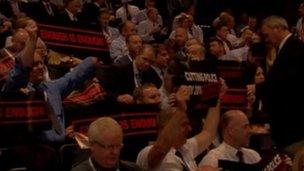Theresa May 'destroying police', warns federation
- Published
The home secretary is "on the precipice of destroying" a police service admired throughout the world, rank-and-file officers have warned.
It comes as forces in England and Wales are experiencing budget cuts of 20% and are in line for some of the most radical reforms for 30 years.
Theresa May is addressing the Police Federation conference in Bournemouth.
She told officers the government is standing firm and that cuts and reforms are essential.
"Policing has to take its share of cuts and for the good of the country we have to see them through," she said.
The home secretary said police should "stop pretending" they were "being picked on", adding that the reforms were in the long-term interest of the service.
As Mrs May came on to the stage ahead of Police Federation chairman Paul McKeever's conference address, a number of officers in the audience held up placards reading "enough is enough".
Meanwhile, BBC home affairs correspondent Danny Shaw <link> <caption>tweeted </caption> <url href="http://twitter.com/#!/DannyShawBBC" platform="highweb"/> </link> that the home secretary had apparently said she did not want to be photographed or filmed in front of a sign on stage saying "20% cuts are criminal".
Winsor review
Mr McKeever said the home secretary's planned measures will ruin a police service admired and replicated throughout the world.
As well as the planned 20% cuts, the federation is unhappy with the government's proposed radical overhaul of pay and conditions, and a challenge to the existing model of policing with the privatisation of an increasing number of jobs.

A number of officers held up placards as Mrs May took her seat at the conference
Mrs May has previously said that police officers will still be "well remunerated" and receive "very good" pensions after the reforms are brought in.
In his speech, Mr McKeever told the conference: "We are about to go through some fundamental change that will alter policing for ever."
He told delegates: "This is a bad deal for police officers, it's a bad deal for the service and most of all it's a bad deal for the British public."
He added that proposed wage cuts were "over and above" other public sector workers and "palpably unfair".
Mr McKeever said the "core values" of policing - "compassion, empathy, discretion, bravery" - would be "diminished" by recommendations in a policing review by former rail regulator Tom Winsor that suggests officers be more academically qualified.
It goes against the "preferred model" of British policing, Mr McKeever said.
In a statement released before the speech, Mr McKeever said: "We have less resilience, fewer warranted officers, a weakened front line and a radically altered model of British policing.
"You are on the precipice of destroying a police service that is admired and replicated throughout the world.
"Home secretary, we are seeing proposals, things being put in place without infrastructure, that will fundamentally change the dynamics of policing.
"You cannot expect officers, those who understood the fiscal situation and accepted that some cuts were necessary, to take an unfair share of the cuts and just sit there and be content with their lot."
Peter Fahy of the Association of Chief Police Officers (ACPO) said forces were providing the best service possible with the resources available.
The Greater Manchester Police Chief Constable added: "Police chiefs are just as concerned about the level of cuts and some of the difficult choices we have to make. But at the same time the whole of the country is facing a national crisis.
"It's about the way that we carry out this debate - that we are clear with the public, that we are making our sacrifices, that we are being really innovative in the way that we provide the service."
Changing conditions
Mr Winsor's review proposed a fundamental shift in how the police are paid - awarding the officers who are taking the greatest risks in front line jobs, while cutting payments and allowances that are no longer justified in the modern workplace.
Other proposals included lifting the ban on compulsory redundancies and potential pay cuts for officers who fail fitness tests.
Mr Winsor also proposed ending early retirement for police officers in their 50s and said potential high achievers should be allowed to enter at inspector level, rather than rise through the ranks.
The Police Federation's Simon Reed and Chief Constable of Greater Manchester Peter Fahy disagree on the impact of the cuts
And he called for recruits to have a minimum of three A-Levels and promotion based solely on skills - not time served.
On 10 May thousands of off-duty police officers marched in central London to protest against the cuts and the proposed change to their working conditions.
Shadow home secretary Yvette Cooper said the government was cutting too far and too fast and that officers considered their forces to be "facing a cliff edge, worried that the service to the public is falling".
Home Office figures show police numbers have fallen back to about 136,000 officers, the lowest figure for a decade.
A Home Office spokesman said: "As a service spending some £14bn a year it is right for the police to make their contribution to reducing the record budget deficit.
"Existing police pay and conditions were designed more than 30 years ago which is why we asked Tom Winsor to carry out his independent review.
"We will continue to ensure that police officers are rewarded for doing an exceptional job."
- Published10 May 2012
- Published29 March 2012
- Published15 March 2012